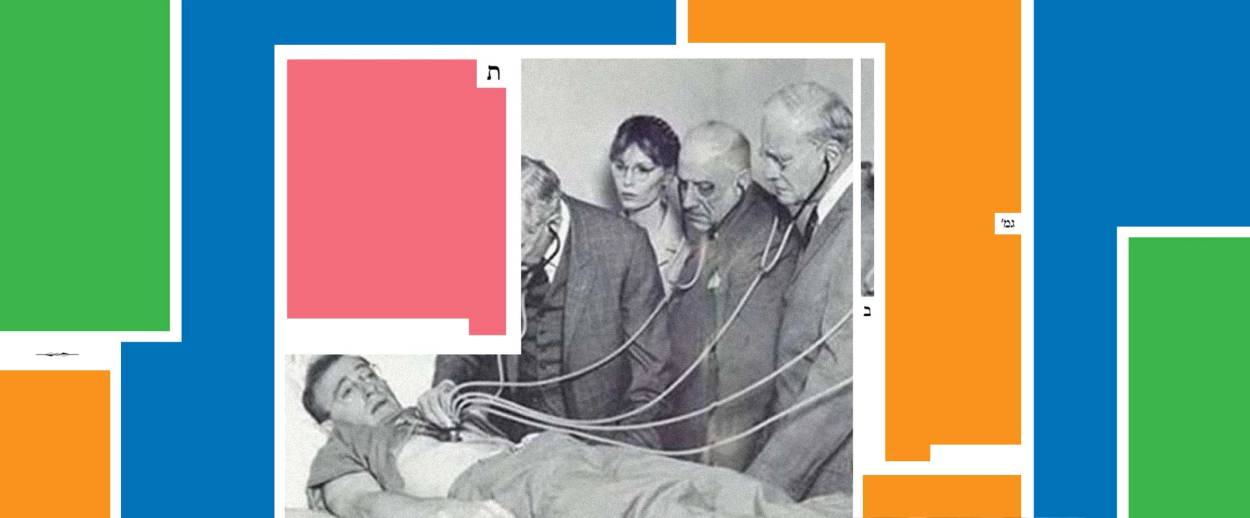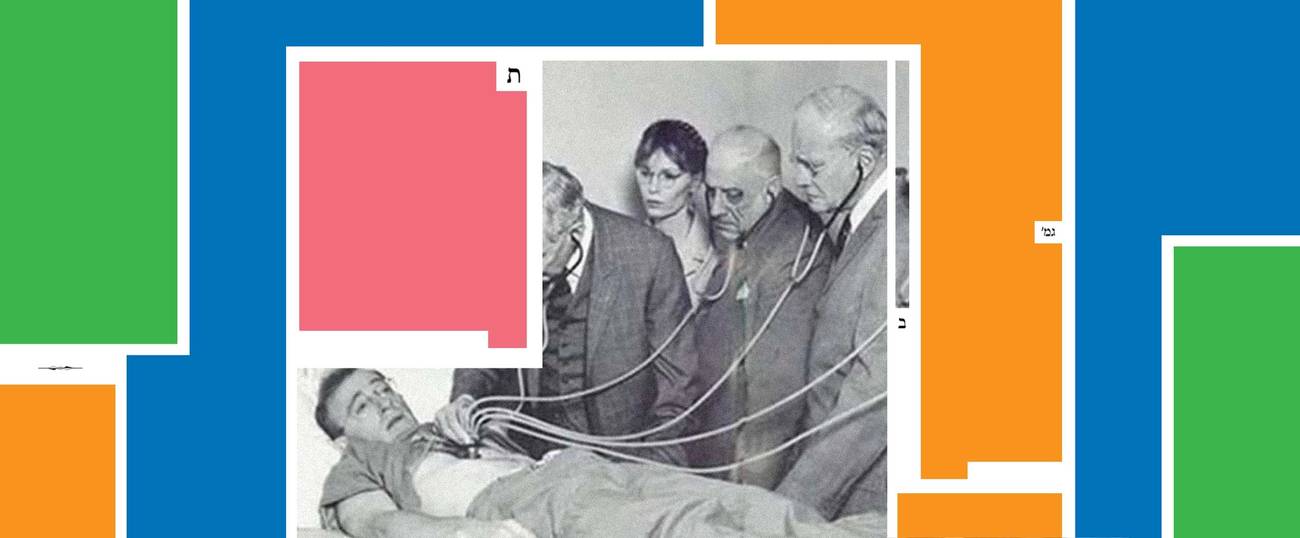An Old Jew Is on His Deathbed, and Says to His Son…
In this week’s ‘Daf Yomi,’ what’s right—and what’s legal—in matters of inheritance




Literary critic Adam Kirsch is reading a page of Talmud a day, along with Jews around the world.
Over the past several weeks, Daf Yomi readers have seen how the Talmud regulates the inheritance of property, building on biblical laws to create a more complex and flexible system. According to the Torah, for example, a man is not free to bequeath his property to whomever he wishes. Rather, inheritance follows an established order, going first to his sons, then his daughters, then his brothers, and finally to more distant male relatives. But as we saw earlier in Tractate Bava Batra, later Jewish law created a workaround, allowing the testator to give his property as a gift, rather than bequeath it as an inheritance. A gift is not subject to the same strict rules.
However, it would be unwise for a man to wait until he was on his deathbed to transfer his property to his favored heir. That is because, as we learned in the Mishna in Bava Batra 135b, it is not enough to leave behind a will; the document must be physically transferred to the intended heir before the testator dies. Thus, if a man dies and a will is found on his person—even if it is “bound to his thigh,” which suggests that it was definitely written by him and not forged—that will has no legal standing: “This is nothing,” the rabbis say. The logic here is that, because the will was not actually given to the heir, the testator might have reconsidered his decision and held it back on purpose.
The prudent course, then, is not to wait until you are on your deathbed, but to write a will while you are still healthy. But it turns out that this course presents another potential problem. To leave property to the heir of his choice, the testator must write out a deed of gift; but if he still has many years to live, he will not want the gift to take effect immediately. In that case, the Gemara instructs him to use a specific formula: The gift is to be effective “from today and after my death.” Such a gift is treated like a deathbed bequest, “in that the recipient acquires it only after the death of the giver.”
However, such a gift creates a legal ambiguity. Say a father writes a document leaving his land to his favorite son “from today and after my death.” Now, who is the owner of the land? The Talmud splits the difference: The son has ownership, but the father is entitled to the produce of the land for as long as he lives. In such a case, neither father nor son can sell the property: “The father cannot sell because it is written to the son, and the son cannot sell because it is in the possession of the father,” says the Mishna in Bava Batra 136a. At most, each can make only a conditional sale. The father can sell his right to the produce of the land, but upon his death, the property will revert to his son. Conversely, the son can sell the land itself, but the purchaser has no right to use it until the father dies.
In the Gemara, the rabbis lose no time in imagining hypothetical situations that test these rules. What would happen, for instance, if the son sold the property during his father’s lifetime, but then the son predeceased the father? Does the property now belong to the purchaser, with the father merely entitled to its produce while he lives? Or does the son’s death cancel the sale, so that the property reverts to the father, who is now free to bequeath it to someone else?
The authorities disagree on this complex question. According to Rabbi Yochanan, true ownership entails the right to dispose of the fruits of what one owns—for instance, the produce from a field or the rent from a house. Because the son didn’t have that right, he wasn’t the full owner of the property, and he didn’t have the power to sell it; thus the purchaser has no claim on the property once the father dies. According to Reish Lakish, the contrary is true; one can fully own a piece of property even if one doesn’t have the right to its proceeds. By this logic, the son’s sale was effective, and the purchaser gets the property once the father dies.
Indeed, the Gemara finds a parallel to this question in another field of law, with the same sages involved. When the Temple stood, landowners were obligated to bring the first fruits of their fields to the Temple and recite a verse thanking God for “the land that you, Lord, have given me.” Say, then, that a man sells his field to a purchaser, but retains the right to the fruits of the field during his own lifetime. When he brings the first fruits to the Temple, does he recite the verse or not? After all, in a strict sense, he cannot say that the land in question has been “given me,” since he is not the legal owner.
Rabbi Yochanan and Reish Lakish give different answers, consistent with their views in the inheritance dispute. According to Yochanan, the man should recite the verse, because his ownership of the produce of the field makes him effectively the owner of the field itself. According to Reish Lakish, however, he does not recite the verse, because there is a difference between owning land and owning the produce of the land. This dispute is not explicitly resolved, but the notes to the Koren Talmud indicate that elsewhere, in Tractate Gittin, the rabbis rule in favor of Reish Lakish’s position.
This week’s reading also covered other aspects of inheritance law. As we have seen, the first heirs of any Jewish man are his sons. But how do we know who a man’s sons are? In most cases, this question wouldn’t arise, because the identity of a father’s sons would be well known to his community. But there might be a case in which a father had an unknown son—say, one from an earlier marriage, who lived far away. In such a case, the Mishna in Bava Batra 134a says, the father’s word is sufficient to establish his paternity: “One who says, ‘This is my son’ is deemed credible.”
On the other hand, “One who says, ‘This is my brother’ is not deemed credible.” Here the Mishna has in mind a situation in which there are several acknowledged sons of a dead father and then a new, unacknowledged man turns up claiming to also be a son. In this case, the testimony of one of the acknowledged sons is not sufficient to establish that the new claimant is, in fact, his brother. However, the law holds that any son who acknowledges the fraternal claim is obligated to divide his inheritance with the new brother, while any son who does not acknowledge the claim does not need to share. This creates a strong disincentive for any single heir to acknowledge such a fraternal claim because it would come at his own expense.
Another topic treated in Chapter Eight of Bava Batra is what is known in English as an “entail,” a complicated inheritance arrangement that figures in the plot of many a classic English novel. With an entail, a testator bequeaths his property to a series of heirs, with the second to inherit on the death of the first, the third on the death of the second, and so forth. This can be a way of keeping an estate intact as a family possession, but it also raises questions about limitations on ownership. Does an heir have a right to sell entailed property, since by doing so he is infringing on the rights of the next heir in succession?
According to Yehuda HaNasi, he cannot sell it permanently; if one heir sells the entailed property, upon his death, the next designated heir has the right to seize it from the purchaser. Rabban Shimon ben Gamliel disagrees, saying that entailed property shouldn’t be sold, but if it is sold, the sale is valid. Abaye comments on this odd ruling: “Who is a cunning wicked person? This is one who provides advice to sell [entailed] property in accordance with the ruling of Rabban Shimon ben Gamliel.” It happens fairly regularly in the Talmud that the rabbis rule that a certain action is legal but shameful; the difference marks the ambiguity of having the same person serve as both a judge and a moral authority.
***
Adam Kirsch embarked on the Daf Yomi cycle of daily Talmud study in August 2012. To catch up on the complete archive, click here.
Adam Kirsch is a poet and literary critic, whose books include The People and the Books: 18 Classics of Jewish Literature.